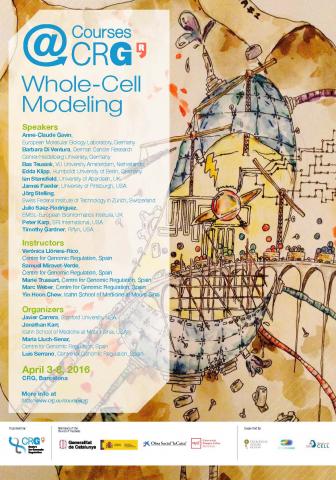Course description.
Whole-cell models are promising tools for predicting phenotype from genotype by accounting for every individual gene and cell function. Whole-cell modeling has the potential to enable rational bioengineering and precision medicine. However, significant work remains to develop fully complete and accurate whole-cell models. The goal of the 2016 Whole-Cell Modeling Summer School is to provide young investigators cutting-edge training in large-scale dynamical modeling and model integration. Please download the poster here.
Why participate?
The course will be the first course focused on multi-algorithm whole-cell modeling. It will teach strategies for building and managing large models which aren’t covered by any other course including multi-algorithm modeling, model organism database curation, surrogate modeling, and software development. The five-day course will feature didactic lectures, interactive hands-on tutorials, and student research talks. The mornings will feature lectures on modeling individual pathways. The afternoons will feature interactive hands-on tutorials on building and analyzing multi-algorithm models to generate and evaluate hypotheses. Throughout the course, students will work toward building a small whole-cell model. In addition, the course will include student talks to enable students to share their own research.
Who is the course for?
The course is designed for PhD students and postdoctoral scholars who wish to gain training in large-scale dynamical modeling. Students should already have a strong foundation in computational systems biology including dynamical modeling and scientific programming.
Pre-requisites
The course will focus on teaching students theory and techniques for large-scale dynamical modeling. Participation in the course requires prior knowledge of dynamical modeling and computer programming including:
Flux balance analysis
Ordinary differential equations
Stochastic modeling
Object-oriented programming in MATLAB or Python
Speakers
- Anne-Claude Gavin, European Molecular Biology Lab, Germany
- Barbara Di Ventura, German Cancer Research Center/Heidelberg University, Germany
- Bas Teusink, VU University Amsterdam, Netherlands
- Edda Klipp, Humboldt University of Berlin, Germany
- Ian Stansfield, University of Aberdeen, UK
- James Faeder, University of Pittsburgh, USA
- Jörg Stelling, Swiss Federal Institute of Technology in Zürich, Switzerland
- Julio Saez-Rodriguez, European Bioinformatics Institute, UK
- Peter Karp, SRI International, USA
- Timothy Gardner, Riffyn, USA
Instructors
Verónica Llórens-Rico, Center for Genomic Regulation, Spain
Samuel Miravet-Verde, Center for Genomic Regulation, Spain
Marie Trussart, Center for Genomic Regulation, Spain
Marc Weber, Center for Genomic Regulation, Spain
Yin Hoon Chew, Icahn School of Medicine at Mount Sinai
Important dates
Application posted: September 2015
Application due: November 2015
Notification of application decision: December 2015
Oral presentation submission: Winter 2016
Notification of oral presentation decision: Winter 2016
Summer school: April 3-8, 2016

